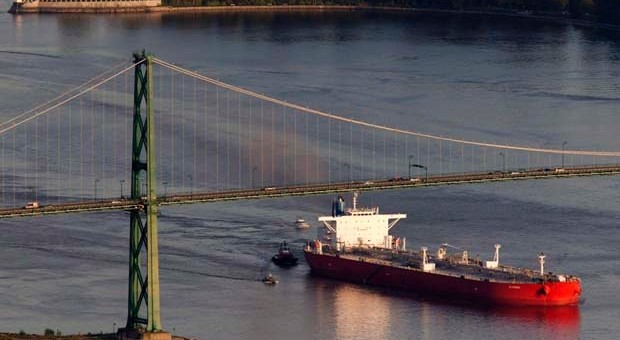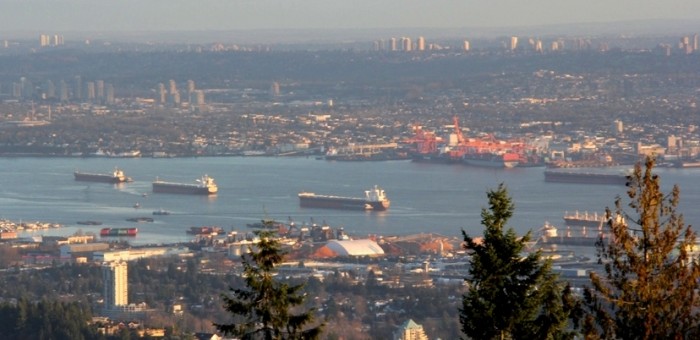Kinder Morgan
Open Letter to Premier Christy Clark
“We are woefully under-resourced,” Clark said in a recent interview with Peter Mansbridge on CBC. This in response to both internal and public reports that British Columbia is unable to respond to an oil spill along the coast, and certainly does not have the techniques, equipment or expertise to manage a diluted bitumen (DilBit), or heavy oil, disaster.
Meanwhile, the Premier is actively seeking revenue guarantees for any heavy oil pipeline originating from Alberta, sending a mixed message to industry, developers and communities. On one hand the fact neither provincial or federal resources will be able to handle even a relatively small marine spill would seem to be a line in the sand – no pipelines, no tankers. On the other hand, smiles and handshakes with Alberta Premier Alison Redford with words suggesting the provinces are closer to a revenue agreement.
Before the province continues down a path of dilbit transport, here are four questions that need to be answered.
An Open Letter to Premier Christy Clark
October 9th,2013
Honourable Christy Clark Premier of British Columbia
Parliament Buildings Victoria BC V8V 1X4
Dear Premier Clark:
I applaud the fact that your government has been consistent in requiring five conditions to be met before you will support enhanced heavy oil tanker traffic off our coast. Consistency is important in providing certainty to the public, business and investors alike. It is for this reason that I am writing to you to seek some further clarification on the second and third of your five conditions. As written, these conditions require:
“World-leading marine oil-spill response, prevention and recovery systems for B.C.’s coastline and ocean to manage and mitigate the risks and costs of heavy-oil pipelines and shipments.”
“World-leading practices for land oil spill prevention, response and recovery systems to manage and mitigate the risks and costs of heavy oil pipelines.”
The Department of Fisheries and Oceans has identified that behaviour models specific to diluted bitumen (dilbit) do not exist. In short neither research nor data on the effects of dilbit released into a marine environment is available. In addition, the procedures, protocols, equipment and expertise that will be required to respond to a potential spill do not exist. This suggests that the current standard for a “world-leading” response is, practically speaking, a fairly low standard.
In my view, the Province’s May 31, 2013 thorough and comprehensive submission to the Joint Review Panel (JRP) did an outstanding job representing the interests of British Columbians. The submission specifically stated that the BC Government required an “effective” heavy oil spill response capacity before it could support a proposal. In that report, the government implies that its criteria for an “effective response” includes meeting specific standards for:
1. Removing dissolved oil from the water column;
2. Dealing with sunken oil in a water course;
3. Implementing a precise leak detection threshold;
4. Committing to a specific and realistic response time to any oil spill at any affected geographic location;
5. Ensuring accessibility of the pipeline year-round to respond to any spill, regardless of seasonal conditions.
In order to provide further clarity to the public, business and investors I have four further questions:
1) Could you please provide a detailed outline of the specific standards and criteria your government uses to evaluate the effectiveness of a proposal’s heavy oil spill response capacity?
2) In your interview with Peter Mansbridge that aired on October 5, 2013, you stated that British Columbia is “woefully under-resourced” to deal with a heavy oil spill. You also acknowledged that BC is already at risk of a heavy oil spill, since tankers leave Burnaby harbour every week transporting dilbit from the Kinder Morgan Trans Mountain pipeline. As I am sure you are aware, the product transported in the Trans Mountain pipeline has changed since it was initially constructed in 1963 and dilbit is a relatively new addition. Given the numerous concerns that you and your government have raised about our current heavy oil spill response capacity, will the proposals to expand the Trans Mountain pipeline or transport heavy oil by rail be subjected to the same specific criteria of “effectiveness” that you have laid out for the Northern Gateway proposal?
3) In this same interview you made it clear that you expect the federal government to provide more resources for marine spill response “before any more heavy oil comes off the coast”. However, the Province’s submission to the JRP clearly states that an effective spill response will “be impossible or severely constrained” in certain regions, regardless of available resources. How, realistically, will further Federal resources address the fact that effective spill response may not even be possible in certain instances?
4) In regards to the heavy oil that is already being transported out of Burnaby harbour as well as any additional heavy oil that is to be transported to the BC coast, would you not agree that it would make far more sense to refine that heavy oil in its entirety in British Columbia prior to shipping it offshore both to mitigate against the risk of a marine dilbit spill and to provide jobs and an economic stimulus to British Columbia?
I thank you in advance for your consideration of these four questions and I very much look forward to your response.
Yours sincerely
Andrew Weaver
.
Media Statement – Andrew Weaver calls for moratorium on dilbit tanker traffic from Burnaby port
Media Statement—September 19, 2013
For immediate release
Vancouver, BC: Andrew Weaver calls for moratorium on dilbit tanker traffic from Burnaby port.
The British Columbia government has rejected the proposed Northern Gateway pipeline due in part to inadequate preparedness for potential marine and land heavy oil spills, while ignoring the fact that the heavy oil, diluted bitumen (dilbit), is shipped weekly from Burnaby, posing serious risks to BC’s coast.
“I am calling on Premier Clark and the BC government to be consistent in their approach to standing up for BC by placing a moratorium on all dilbit tanker traffic on our coast, including existing and proposed traffic from the Trans Mountain facility in Burnaby.”
The government has made it clear that any heavy oil pipelines and tanker traffic along the BC coast must meet 5 basic criteria, including world-leading marine and land oil spill response and recovery systems.
Meanwhile, documents from the Department of Fisheries and Oceans identified that: “Behaviour models specific to dilbit spills do not exist, and existing commercial models for conventional oil do not allow parameter specific modifications.” In short, should a spill occur, the research, data and evaluation of the effects of dilbit on land, fresh water and marine environments are simply not available, neither are the procedures, protocols, equipment and expertise that will be required to respond. A dilbit spill in Vancouver harbour would have profound and long-lasting consequences.
In its thorough submission to the Northern Gateway Joint Review Panel the British Columbia Government stated: “the Province is not able to support approval of the project, and submits that its concerns respecting NG’s ability to respond to a spill should be given serious consideration by the JRP”.
However, while the government has made a strong case against dilbit exports from the Northern Gateway pipeline, it has failed to address the very real threat that existing dilbit tanker traffic from the Trans Mountain facility in Burnaby already poses to the BC coast. Currently 5 tankers pass through the harbour each month carrying dilbit, a number that could increase dramatically to 34 with the proposed twinning of the Trans Mountain pipeline. If the proposal is successful, the Trans Mountain pipeline will transport 890,000 barrels a day, making it nearly double the capacity of the proposed Northern Gateway pipeline, which would transport 525,000 barrels a day.





